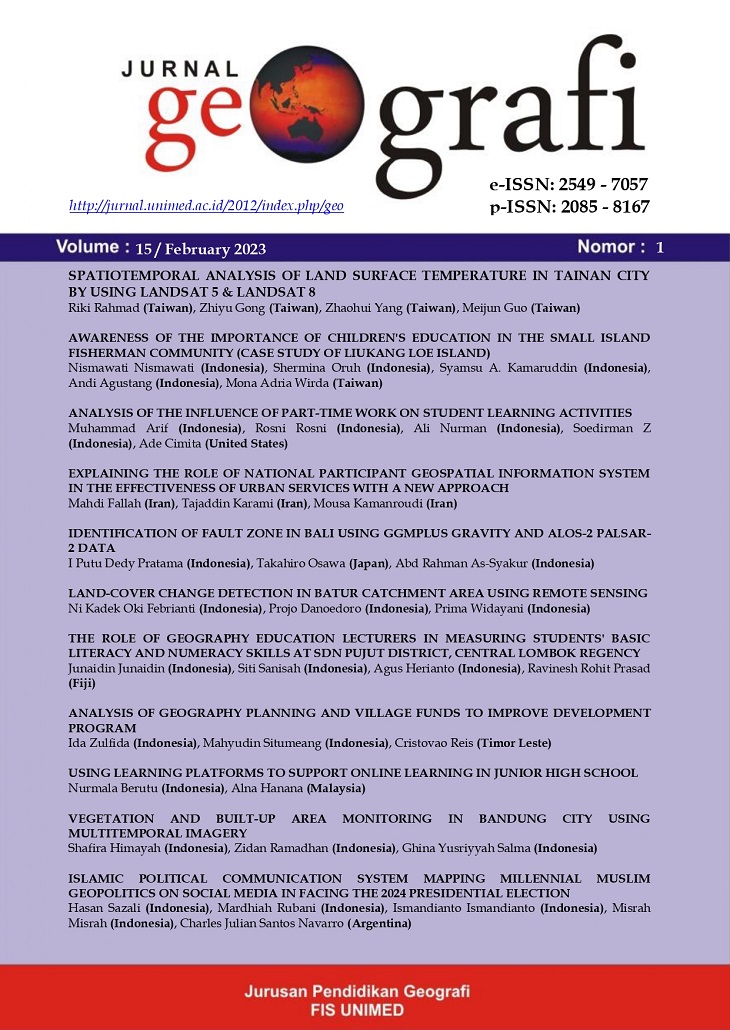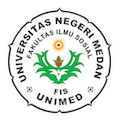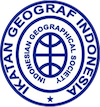The Role of Geography Education Lecturers in Measuring Students' Basic Literacy and Numeracy Skills at SDN Pujut District, Central Lombok Regency
DOI:
https://doi.org/10.24114/jg.v15i1.42453Abstract
The strategy to improve the quality of education in schools is to improve the management of literacy culture. Literacy refers to the process of reading, writing, and speaking to build, integrate, and critique meaning. Many researchers studied teachers' role in improving elementary school students' literacy and forgot how lecturers also have an essential role. This study aims to identify geography education lecturers' role in measuring students' basic literacy and numeracy skills at SDN Pujut District, Central Lombok Regency. Research Methods use descriptive qualitative. Interviews, observation, and descriptive analysis of documents by purposive sampling obtained data. To increase the credibility of research informants using the principle of data saturation. The results of this study show that students' literacy and numeracy skills are still low because teachers' ability in Central Lombok Regency is also considered to have decreased, so the support of parents is considered a servant. This research also shows that the role of geography education lecturers is very significant in measuring literacy and numeracy skills applied to all fields of learning in an integrated manner so that the roles of teachers and lecturers both have an essential role in measuring the literacy and numeracy of elementary school students.Keywords: Lecturer Role, Literacy Ability, Basic Numeracy of StudentsReferences
Aeni, A. nur. (2016). Implementation of PGSD student character education to instill the value of responsibility in elementary school students. Didactic Proceedings: National Seminar on Basic Education, 1(1), 106“125. http://proceedings.upi.edu/index.php/semnaspendas/article/view/1170
Althafi, P. A., & Ramadhana, M. R. (2021). The Role of Family Communication in the Implementation of Family Functions in Covid-19 Health Literacy in Jakarta The Role of Family Communication in the Implementation of Family Functions in Covid-19 Health Literature in Jakarta. E-Proceedings of Management, 8(4), 4055“4064.
Amilia, F. (2019). The Role of Teachers in the Development of School Literacy. Proceedings of the National Seminar and Workshop Unmuh Jember, 44“59.
Antonius. (2020). The Role of Village Head Communication in Education Development. FOCUS: Scientific publications for students, teaching staff and alumni of Kapuas Sintang University. , 18(2). https://doi.org/10.51826/fokus.v18i2.417
Auberry, K. (2018). Increasing students' ability to identify fake news through information literacy education and content management systems. Reference Librarian, 59(4), 179“187. https://doi.org/10.1080/02763877.2018.1489935
Aziza, F. N., & Jonah, M. (2020). The Role of Parents in Guiding Children During Study From HAziza, F. N., & Yunus, M. (2020). The Role of Parents in Guiding Children During The Study From Home During the Covid 19 Pandemic. National Conference on Education, 19“21.ome During the Covid 19 Pandemic. National Conference on Education, 19“21.
Boonk, L., Gijselaers, H. J. M., Ritzen, H., & Brand-Gruwel, S. (2018). A review of the relationship between parental involvement indicators and academic achievement. Educational Research Review, 24, 10“30. https://doi.org/10.1016/j.edurev.2018.02.001
Cahyani, A. D., Yulianingsih, W., & Roesminingsih, M. V. (2021). Synergy between Parents and Educators in Child Learning Assistance during the Covid-19 Pandemic. Journal of Obsession : Journal of Early Childhood Education, 6(2), 1054“1069. https://doi.org/10.31004/obsesi.v6i2.1130
Costello, D. A. R. (2012). The impact of a school's literacy program on a primary classroom. Canadian Journal of Education, 35(1), 69“81.
Cremin, T., Flewitt, R., Swann, J., Faulkner, D., & Kucirkova, N. (2018). Storytelling and story-acting: Co-construction in action. Journal of Early Childhood Research, 16(1), 3“17. https://doi.org/10.1177/1476718X17750205
Dantes, N., & Handayani, N. N. L. (2021). Improving School Literacy and Numeracy Literacy through a Blanded Learning Model in Grade V Students of SD Kota Singaraja. WIDYALAYA: Journal of Educational Sciences, 1(3), 269“283. http://jurnal.ekadanta.org/index.php/Widyalaya/article/view/121
Dasor, Y. W., Mina, H. M., & Sennen, E. (2021). ( the Role of the Teacher in the Literacy Movement in Elementary. Primary Education Literacy, 2(2), 19“25.
Fauziah, G., & Lestari, A. W. (2018). Cultivating the Information Literacy Movement for Elementary School Students in South Tangerang. Edulib, 8(2), 167. https://doi.org/10.17509/edulib.v8i2.13490
Fidesrinur, F., Shah, A. H., & Amelia, Z. (2022). The Role of Field Supervisors in Improving the Effectiveness of the Teaching Campus Program. Journal Of Al-Azhar Indonesia Humanities Series, 7(2), 73. https://doi.org/10.36722/sh.v7i2.1133
Fitriana, E., & Khoiri Ridlwan, M. (2021). Transformative Learning Based on Literacy and Numeracy in Elementary Schools. TRIHAYU: Journal of Elementary Education, 8(1). https://doi.org/10.30738/trihayu.v8i1.11137
Frankel, K. K., Becker, B. L. C., Rowe, M. W., & Pearson, P. D. (2016). From"What is Reading?" to What is Literacy? Journal of Education, 196(3), 7“17. https://doi.org/10.1177/002205741619600303
Halvorsen, A. L., Duke, N. K., Brugar, K. A., Block, M. K., Strachan, S. L., Berka, M. B., & Brown, J. M. (2012). Narrowing the achievement gap in second-grade social studies and content area literacy: The promise of a project-based approach. Theory and Research in Social Education, 40(3), 198“229. https://doi.org/10.1080/00933104.2012.705954
Hasni A, Witono A, & Khair B. (2022). The role of teachers in creating a culture of literacy through the school literacy movement. Journal of Classroom Action Research, 4(3), 60“66. https://doi.org/10.29303/jcar.v4i3.1893
Inten, D. N. (2017). The Role of the Family in Instilling Early Literacy in Children. Golden Age: Journal of Early Childhood Education, 1(1), 23“32. https://doi.org/10.29313/ga.v1i1.2689
Isaac, M., Nora Saiva Jannana, Sara Diana, Nur Azizah, & Ita Nurmalasari. (2021). Developing Student Information Literacy Skills in Senior High School. MANAGERIA: Journal of Islamic Education Management, 6(1), 125“140. https://doi.org/10.14421/manageria.2021.61-08
Jariah, S., & Marjani. (2019). The Role of Teachers in the School Literacy Movement. Proceedings of the National Seminar on Education of the Postgraduate Program of PGRI Palembang University, 846“856. https://jurnal.univpgri-palembang.ac.id/index.php/Prosidingpps/article/view/2643
Krajcik, J. S., & Merritt, J. (2012). Engaging Students in Scientific Practices : what does constructing and revising models look like in the science classroom? The Science Teacher, March(March), 38“41. http://learningcenter.nsta.org/files/tst1203_38.pdf
Mahmud, M. R., & Pratiwi, I. M. (2019). Student Numeracy Literacy In Unstructured Problem Solving. KALAMATIKA Journal of Mathematics Education, 4(1), 69“88. https://doi.org/10.22236/kalamatika.vol4no1.2019pp69-88
Marlyono, S. G., Pasha, G. K., & Nandi. (2016). The Role of Disaster Information Literacy in Disaster Preparedness of the People of West Java. Gea. Journal of Geography Education, 16(2), 116“123. https://ejournal.upi.edu/index.php/gea/article/view/4491/9968
Marmoah, S., Poerwanti, J. I. ., & Suharno. (2022). Literacy culture management of elementary schools in Indonesia. Heliyon, 8(4), e09315. https://doi.org/10.1016/j.heliyon.2022.e09315
Mastoah, I., & MS, Z. (2020). Parents' Obstacles in Accompanying Children to Learn during the Covid-19 Period in Serang City. As-Sibyan: Journal of Early Childhood Education, 5(2), 121“128. http://jurnal.uinbanten.ac.id/index.php/assibyan/article/view/3663
Nurasiah, I., Azwar Uswatun, D., & Rizqia Amalia, A. (2017). Building Character And Literacy Skills Of Primary School Students Through Puppet Contemplative Sukuraga. Vidyottama Sanatana: International Journal of Hindu Science and Religious Studies, 1(1), 40. https://doi.org/10.25078/ijhsrs.v1i1.152
Nuryana, Z., Suroyo, A., Nurcahyati, I., Setiawan, F., & Rahman, A. (2020). Literation movement for leading schools: Best practice and leadership power. International Journal of Evaluation and Research in Education, 9(1), 227“233. https://doi.org/10.11591/ijere.v9i1.20279
Pearson, P. D., & Billman, A. (2016). Reading to learn science: A Right that extends to every reader-expert or novice. Human Rights in Language and STEM Education: Science, Technology, Engineering and Mathematics, September 2018, 1“282. https://doi.org/10.1007/978-94-6300-405-3
Pujut. (2019). Statistics and Spatial of Pujut District 2019. In Central Bureau of Statistics Pujut. https://satudata.lomboktengahkab.go.id/download/5e3d0dd3e2275
Romance, N. R., & Vitale, M. R. (2012). Science IDEAS: A research-based k-5 interdisciplinary instructional model linking science and literacy. Science Educator, 21(1), 1“11. http://proxy.libraries.smu.edu/login?url=http://search.ebscohost.com/login.aspx?direct=true&db=eue&AN=78301406&site=ehost-live&scope=site
Safitri, V., & Dafit, F. (2021). The role of teachers in reading and writing learning through the literacy movement in elementary schools. Journal of Basicedu, 5(3), 1356“1364. https://jbasic.org/index.php/basicedu/article/view/938
Sajawandi, L., Sa'ud, U. S., & Musthafa, B. (2020). Student candidates' literacy analysis using an ICT-based tool. Journal of Physics: Conference Series, 1469(1). https://doi.org/10.1088/1742-6596/1469/1/012088
Sinuhaji, M., Lumbntoruan, W., & Damanik, M. R. S. (2013). LEARNING INNOVATION IN THE INTRODUCTORY COURSE OF REGIONAL DEVELOPMENT AND DEVELOPMENT PLANNING IN THE DEPARTMENT OF GEOGRAPHY EDUCATION FIS UNIMED. Journal of Geography Education, 5(1).
Smagorinsky, P. (2001). If meaning is constructed, what is it made from? Toward a cultural theory of reading. Review of Educational Research, 71(1), 133“169. https://doi.org/10.3102/00346543071001133
Sugiyono. (2011). Understanding Qualitative Research. Alfabeta.
Suparjan, S., & Mariyadi, M. (2020). Teaching and Learning Process During the Covid19 Pandemic at the Elementary School Level in West Kalimantan. Journal Of Didika: Scientific Vehicle For Basic Education, 6(2). https://doi.org/10.29408/didika.v6i2.3044
Susanti, E., & Syam, S. S. (2017). The Role of Teachers in Improving the Mathematical Literacy Ability of Indonesian Students. Mathematics and Mathematics Education Seminar, November 2017, 1“6. https://www.researchgate.net/publication/328813314_Peran_Guru_dalam_Meningkatkan_Kemampuan_Literasi_Matematika_Siswa_Indonesia
Utarini, A. (2020). Tak Kenal Maka Tak Sayang : Calitative Research in Health Services (Galih (ed.)). Gadjah Mada University Press.
Wahyuni, V. E. (2017). The Role of Learner Teachers as Activists of the School Literacy Movement: Challenges and Solutions. FKIP Unswagati Repository, 21(1), 1“9. http://journal.um-surabaya.ac.id/index.php/JKM/article/view/2203
Yulianingsih, W. (2016). The Role Of Family Education In Child Literacy. Proceedings of the Journal of Out-of-School Education, 56“65.










